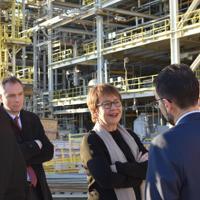EBRD, Türkiye discuss strategies for a low-carbon future – Latest News
ANKARA
In the run-up to COP28, President of the European Bank for Reconstruction and Development (EBRD) Odile Renaud-Basso met with Industry and Technology Minister Mehmet Fatih Kacır in Ankara to discuss the findings of an EBRD-led study into low-carbon pathways (LCPs) in the steel, cement, aluminum and fertilizer sectors.
Cumulatively, industry emits 37 percent of total Turkish GHG emissions, accelerating their decarbonization is critical for Türkiye to meet its carbon neutrality commitment by 2053, according to EBRD.
The findings of the LCP study will provide clear signals to private industry players, financiers and investors about the technology requirements and timing of decarbonization investments, enabling greater understanding of the risks involved and informing the development of specific financing plans, the banks said in a statement.
In 2022, the Industry and Technology Ministry proposed a detailed study, led by the EBRD, to assess the technology solutions, the investment needs and the policy enablers to help the sectors in question decarbonize in line with Türkiye’s climate ambitions.
The study estimates that the decarbonization of these sectors will require investments in the region of more than $50 billion and will result in cumulative GHG emission savings of more than 135MtCO2 compared to a business-as-usual scenario by 2053.
“We are very pleased to be cooperating with the EBRD and look forward to establishing effective mechanisms to provide the finance needed to accelerate investments to support the low-carbon development of Turkish industry,” said Kacır.
Türkiye is one of their biggest countries of operation and they are keen to continue supporting industrial companies on their journey towards carbon neutrality, said Renaud-Basso.
To date, the EBRD has invested more than 19 billion euros in the Turkish economy, largely in the private sector.


